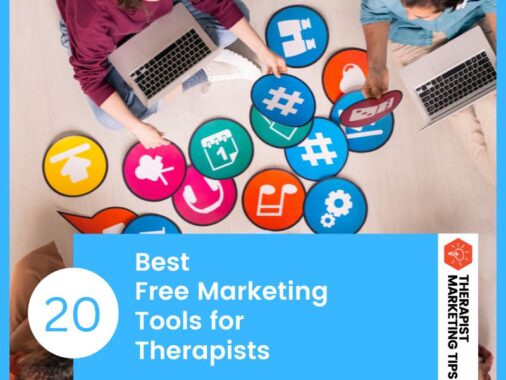Whether we’re newly qualified or well-established, there’s one question all of us have at some point in our therapy career:
How can I get more counselling clients and grow my private practice into a profitable business?
In this guide, I’ll answer that question by drawing on my experience as both a qualified therapist and long-time marketing professional and offering 11 new strategies that could make 2024 your counselling practice’s most successful year yet.
11 Ways to Get More Counselling Clients in 2024
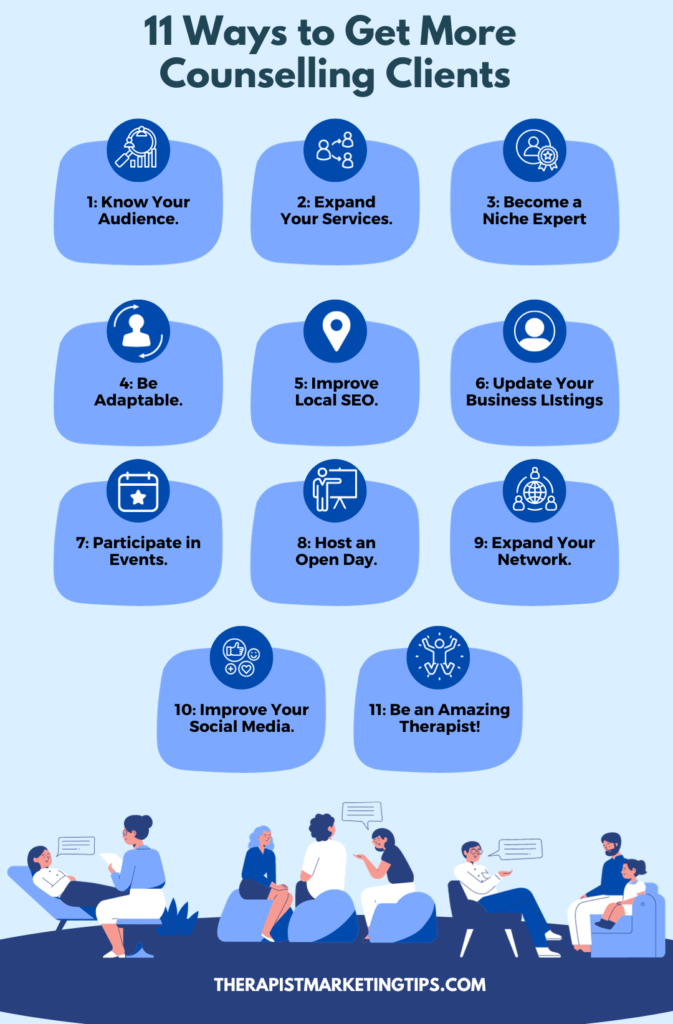
1. Get to Know Your Target Clients Better
I could give you a million and one private practice growth strategies, but none of them will help you if you don’t use them to demonstrate that:
A. You understand the problems your target audience is facing
B. You understand what they look for when choosing a counsellor
C. You are uniquely placed to give your audience what they’re looking for and help them with their problem.
Naturally, this means it’s time to dig into some audience research.
Here’s a few ways you can do that:
A. Review Your Past Work
Go back over your client work from the last six months to a year. If you’re a new counsellor and you don’t have that much experience yet, simply use whatever clients you have worked with, even those in placement.
What you’re looking for here are any themes or recurring issues you may have helped your clients with, especially (though not exclusively) those issues you’re not currently addressing with your existing marketing efforts.
We all know that clients may initially present with one issue, only to discover that there’s a whole world of other issues once we really get deep into the trenches with our clients.
It may be that even though you don’t advertise yourself as a counsellor who can help with alcohol and substance misuse, these issues are common themes running throughout your work with clients who initially come to you with something else entirely.
This tells you that there may be an unmet audience need that you can cater to by expanding your services or adjusting your marketing strategy to get more clients into your private practice.
B. Analyze Your Audience’s Search Queries
Given the digitally-dominated world we live in, it makes sense that many of the techniques for increasing your client base will centre around optimizing your online presence so that as many people as possible can find you.
Now, you probably already know that one of the main ways those people will find you is by using a search engine like Google.
Here’s where things get exciting.
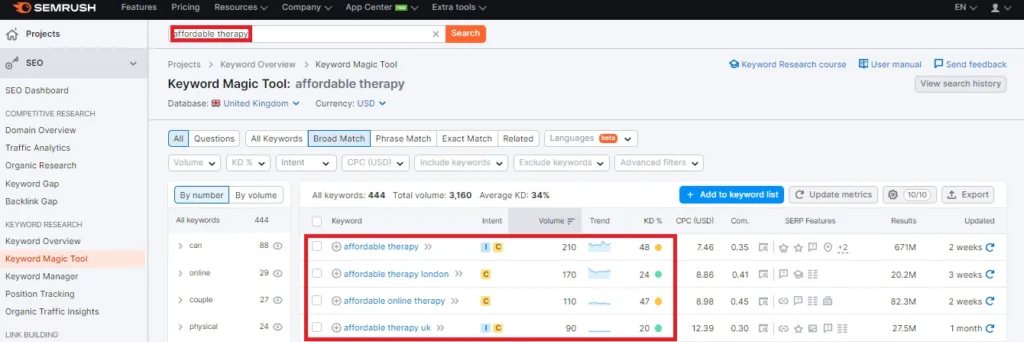
Through a process called keyword research, you can explore and examine the actual search terms people enter into Google to find counselling-related information and services.
Why is that exciting?
Simple:
This research process unveils lots of valuable insights about what your audience is looking for and why they’re looking for it, which is crucial for tailoring your content and services to align precisely with their needs.
By learning how to do keyword research, you’ll be able to:
- Understand the subjects that most resonate with your audience so that you can cover these subjects on your website
- Understand the user intent behind each keyword which helps you determine which type of content will work best to target each keyword.
- Craft content that aligns with high-volume and relevant keywords, increasing the likelihood of your pages appearing in search engine results and driving organic traffic.
- Identify emerging keywords and topics in your industry, allowing you to stay ahead of trends and position your content as a go-to resource in your niche.
All these benefits help you to draw more visitors to your website and, ultimately, convert those visitors into paying clients.
2. Expand Your Service Offer
Of course, one of the easiest ways to get more counselling clients is to offer more services.

For example, if your current service offer is focused on one-on-one sessions with clients in your private practice, you might want to consider offering online counselling or branching out into group therapy.
Naturally, you’ll want to ensure a smooth transition into these new service offerings, especially if group therapy or online counseling is uncharted territory for you.
Spend time working with your supervisor or seeking guidance from experienced colleagues to gain valuable insights and advice.
Undergoing specialized training or workshops in group therapy dynamics or online counseling platforms can equip you with the necessary skills and knowledge to practice safely and effectively in these new modalities.
This proactive approach not only instils confidence in your ability to provide quality care but also demonstrates your commitment to continuous professional development, enhancing your overall credibility in the counseling field.
3. Enhance Your Reputation as a Niche Expert
From broadening out to narrowing in, focusing all your efforts on becoming the go-to expert in a particular niche is an effective way to create demand for your private practice services.

Whether it’s a specific client issue such as performance anxiety or working with a particular demographic such as LGBTQ+ clients, becoming a niche expert cultivates trust and credibility among your audience.
Cultivating that trust makes a big difference:
- Adobe notes that 7 out of 10 customers will buy from brands they trust and ditch those they don’t.
- 50% of consumers would pay more to buy from a brand they trust, according to Salsify.
What’s more, as your reputation grows, you also open doors to receiving referrals from other professionals who may not have the level of expertise or experience that you do.
So, how do you begin to establish yourself as a niche expert in counselling?
Here’s a few suggestions:
A. Up your CPD game
–Expand your knowledge of your chosen niche by reading books from established experts in that field, attending seminars and events, and continuing to stay abreast of the latest trends and research.
B. Publish original, high-quality helpful content
Rattling off the same tips and advice as everybody else isn’t going to help you stand out. Instead, focus on using your blog or website to publish original content that draws on your own unique expertise and experience as a therapist and above all else, is helpful to your audience.
This sets you apart from your competitors and is a great way to demonstrate why you’re uniquely positioned to help your potential clients with their problems.
For help with this one, I recommend reading about Google’s helpful content guidelines as this will help you to publish work that not only provides value to readers, but also gets ranked in search results.
C. Publishing Research or Articles
Contribute to academic journals, magazines, or reputable websites within your niche, establishing yourself as a thought leader through research and insightful commentary.
4. Be Prepared to Pivot and Adapt
One lesson I learned the hard way is that if you are going to position yourself as an expert on something, then it has to be something that people actually want.
Along with my counselling work, I’m also a qualified hypnotherapist.
When I first started my hypnotherapy practice, I wanted to specialize in sports performance as this is a big area of interest for me.
So, I continued to invest in CPD on this subject and made ads and other marketing materials around hypnotherapy for sports performance.
Despite my best efforts, I saw not one client for that issue, though I did notice that I was seeing many clients who were worried about self-medicating through alcohol.
So, I quickly pivoted and focused most of my marketing efforts on helping people with alcohol misuse.
It was a strategy that paid off for me.
Now that I was no longer wasting time and money advertising a service that nobody wanted, I was able to focus on what people did want and get more clients through the door.
As a therapist, you’re used to trying different approaches with your clients. If one therapeutic technique isn’t getting anywhere, you switch tactics and try different things until you find a way of working that resonates with your clients.
When it comes to marketing your private practice, you need to be doing the same thing. If one strategy isn’t generating any clients, pivot and adapt to one that is.
If one type of service isn’t generating any interest, focus your marketing efforts on a different one.
In other words, do more of what works and less of what doesn’t.
5. Optimize Your Online Presence for Local Search
Unless you’re operating exclusively online, you absolutely need to focus on local search engine optimization (SEO) to get more counseling clients from within a certain radius of your practice.
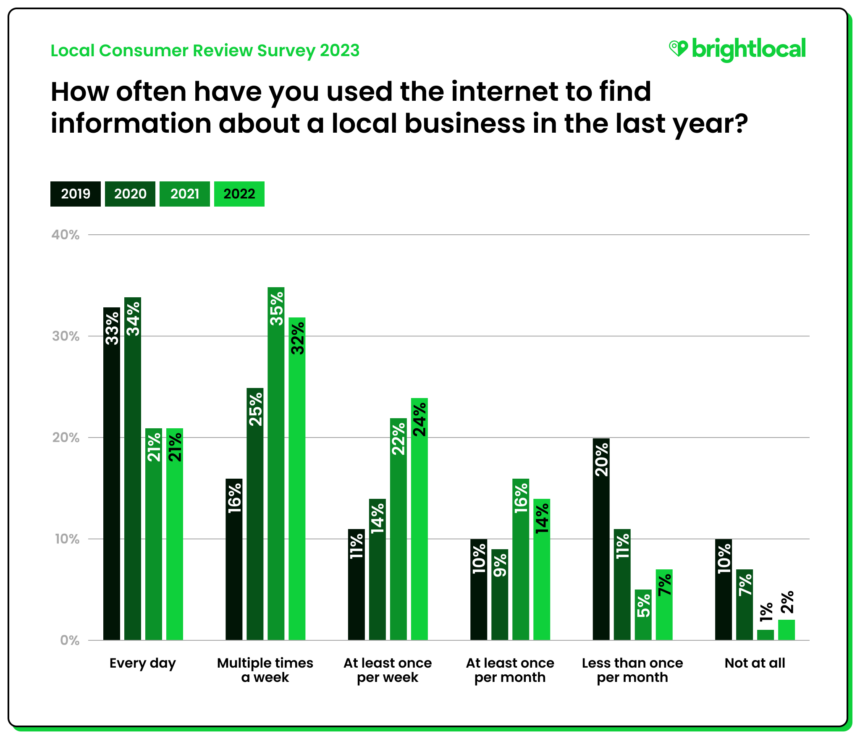
BrightLocal’s Local Consumer Review Survey reveals that 97% of consumers search online for local businesses, and there’s no reason to believe this doesn’t include therapy businesses.
As such, it’s important that you do everything you can to ensure that, when customers do search for counselling services near them, it’s your business they find.
This means not only optimizing your website with keywords that target local clients but also expanding your marketing efforts beyond your website.
At a bare minimum, you should at least set up a free Google My Business profile.
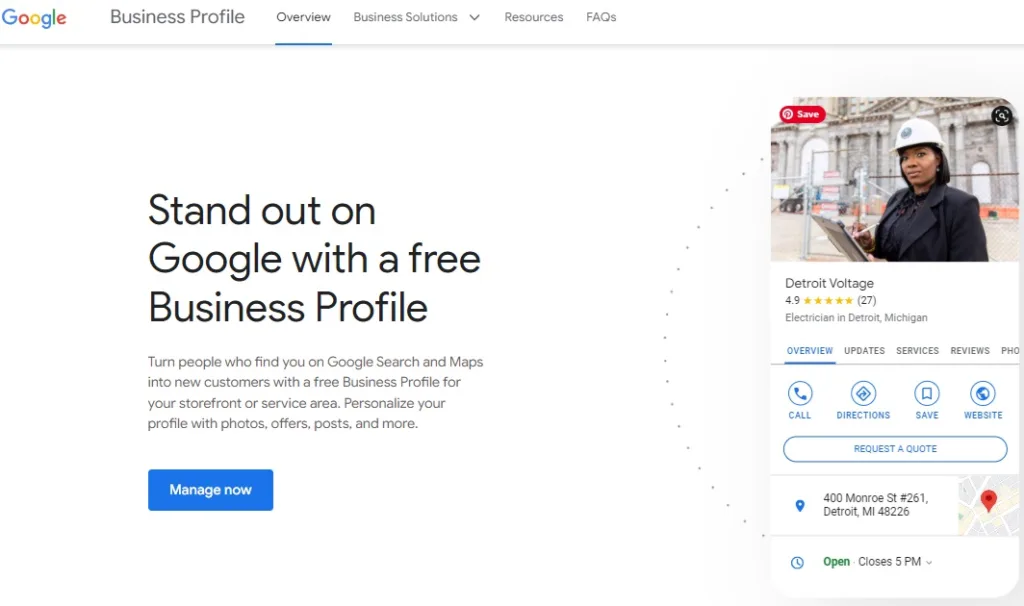
Google My Business (GMB) is an essential tool that can significantly boost your visibility in search results for “near-me” type search queries such as “addiction counseling near me,” or “qualified counsellor in Wigan.”
Your profile can display not only key information such as your contact details, website, and list of services, but also pictures, client reviews, and other details. This means that not only are you being seen by more people, but you’re also giving those people all the information they need to make a decision about whether to investigate further and possibly make a booking.
Other ways to optimize your online presence with local SEO include:
A. Create Profiles on Local Business Directories
You may already be set up on counseling and therapy directories, but don’t forget the more all-encompassing business directories such as Yelp.
This approach has all kinds of benefits.
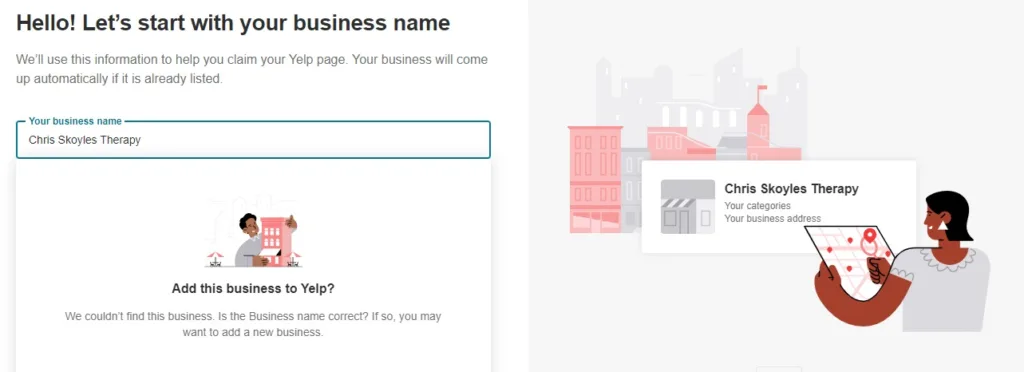
For one thing, it means that you’re visible in more places across the web, helping you to reach a broader audience and attract clients who may not find you through a traditional search engine.
For another, some of these websites will allow you to include what’s called a “do-follow” backlink which, in simple terms, is a link from their site to yours that search engines interpret as an endorsement from the linking site.
The more of these endorsements you have, the stronger your website’s credibility becomes in the eyes of search engines, contributing to improved search rankings and a greater likelihood of potential clients discovering and choosing your counseling services.
B. Create Local Content and Resources
Consider using your website to publish a list of local mental health organizations or resources for clients.
Elsewhere, craft blog content or create videos with a localized angle, perhaps addressing local issues and challenges or referencing events and landmarks in your area.
C. Maintain NAP Consistency
Ensure that your business name, address, and phone number (NAP) information is consistent across all online platforms, including your website, social media profiles, and local directories.
When search engines encounter consistent information across various platforms, it enhances their confidence in the legitimacy of your business, positively impacting your local search rankings.
Consistent NAP information also plays a vital role in the user experience. Potential clients searching for counseling services may explore multiple online avenues, including your website, social media profiles, and local directories.
If they encounter conflicting or outdated information, it can lead to confusion and frustration, potentially causing them to lose trust in your services.
For step-by-step instructions and best practices, see my complete guide to NAP consistency for beginners.
6. Update and Optimize Your Counseling Directory Listings
While you’re busy creating other business listings for your therapy practice, you might as well take some time to update and optimize any listings you have on sites like Counseling Directory or Psychology Today.
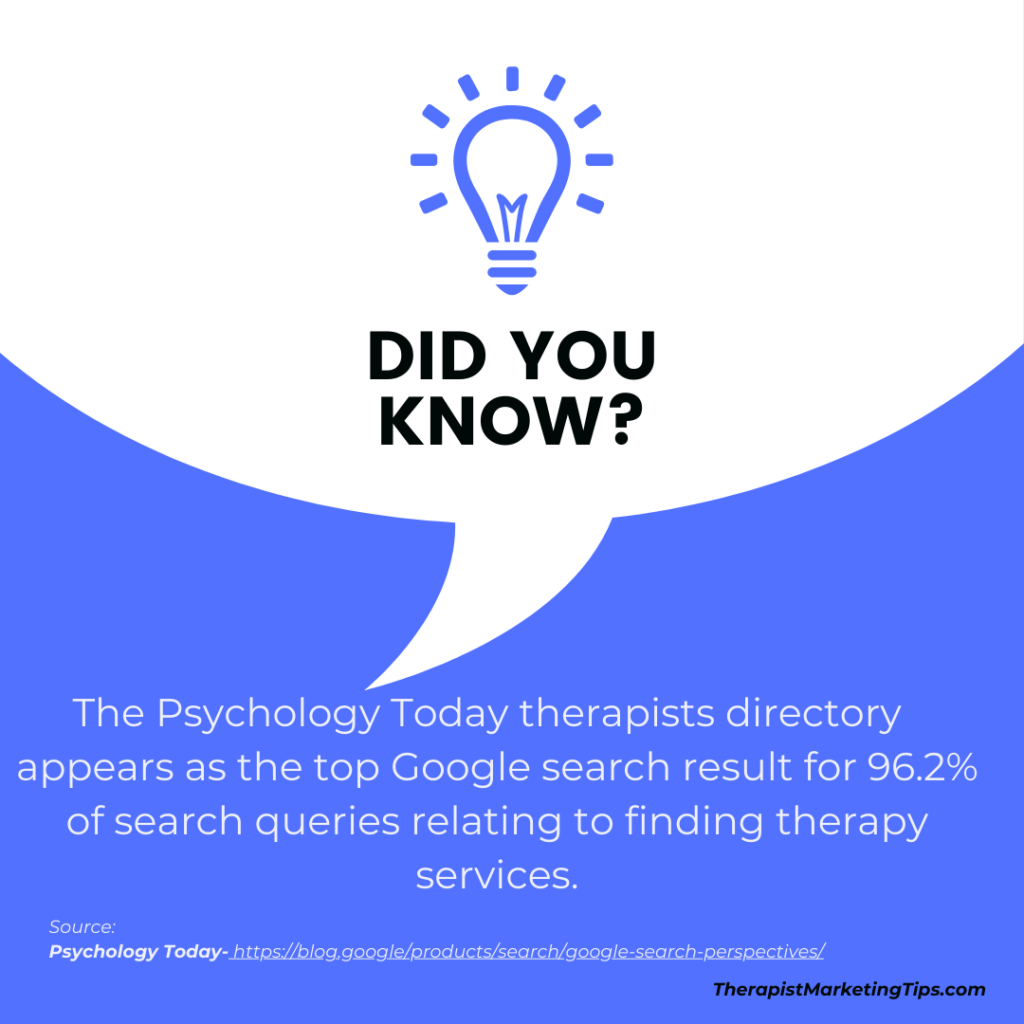
Here, you not only want to ensure you’re maintaining NAP consistency, but also that your profile still accurately reflects your services, pricing, and other relevant information.
Beyond that, follow these suggestions to really make your profile work for you:
- Write a compelling and engaging headline that hooks people in
- Use Plain English and avoid jargon in your therapy practice description
- Incorporate local and practice-specific keywords into your description
- Talk about what makes you unique as a therapist, such as your niche expertise and experience. Why should clients choose you over the scores of other therapists listed?
- Use high-quality images and -where possible- video content to really stand out and provide added value to potential clients
- Include a compelling Call to Action (CTA) that encourages readers to book in with you.
7. Book a Slot at Health and Wellness Events
Stepping away from the world of digital marketing, your presence at offline events such as health and wellbeing fairs can boost brand awareness and visibility.
Booking a booth or table at relevant local events may even land you some direct leads on the day, though that isn’t necessarily the main goal here.
Rather, the objective is to simply make more people aware that you exist and that you’re there to help.
To achieve this, Prepare eye-catching and informative materials such as brochures, business cards, or branded giveaways. These serve as tangible reminders of your counseling practice and can be taken home by attendees who now know exactly where to turn and how to get hold of you when they need help.
Don’t forget too, that participating in local events also demonstrates your commitment to community wellbeing. This not only enhances your public image but also fosters a sense of community engagement, making your counseling practice more relatable and accessible.
8. Host an ‘Open Day’ or Workshop
Telling you to participate in relevent events is all well and good, but what if there aren’t any?
Simple:
Create your own.
Consider hosting an open day at your practice, inviting people to drop by, learn about what you do, and participate in a workshop or presentation on some aspect of managing mental well-being.
How do you convince people to come through the door?
Well, freebies always work for one.
Lay out a few hors d’oeuvres and soft drinks. If your budget will allow it, spring for some branded promotional items that people can take away with them.
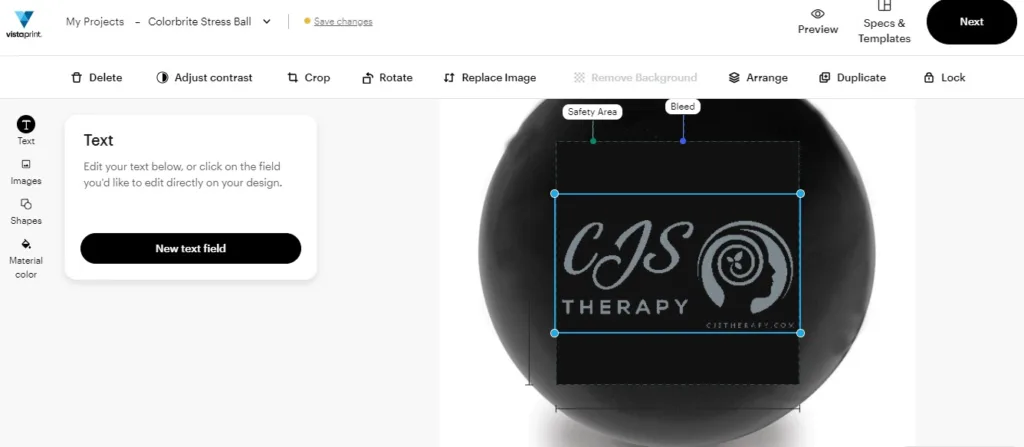
Stress balls are always great giveaways for therapists, just remember to put your therapy practice logo and contact details on there.
Promote your event by distributing flyers and posters around your local area, and perhaps learn how to write a press release to spread the word via local media.
If you have the space for it, you could even consider inviting other local health and well-being businesses to participate as vendors, expanding your event’s appeal.
9. Expand Your Professional Network
There are more ways to increase your client base than marketing directly to clients.
Expanding your network by connecting with other mental health professionals, local businesses, and non-profits can help you to get more referrals.
This is especially true if you took my earlier advice about establishing yourself as an expert.
When other therapists and professionals get to know you as an authority on a particular counselling niche, they come to see you as someone they can trust to help clients they themselves may be unable to.
What’s more, growing your network can open doors for public speaking engagements or delivering workshops which, in turn, can help you generate more interest in your counselling services.
Do some research to find current business networking events near you. If all else fails, your local chamber of commerce should at least be able to point you in the right direction.
Don’t forget about online networking opportunities, too.
As well as maintaining an active presence on LinkedIn, consider participating in Facebook groups for local businesses or mental health professionals to expand your reach.
10. Fine-Tune Your Social Media Strategy
Since we’re on the subject of social media, let’s talk about one of the biggest mistakes I see people make with it.
These days, even the most rudimentary marketing advice recommends using social media to grow your business.
The problem I see a lot is that some people take this advice to mean “just post anything anywhere and you’ll get clients,” and thus we get an endless cycle of inspirational quotes that may get a few likes here and there but don’t actually generate new business.
If you’re going to use social to grow your business, then you need to have a clearly defined social media plan that aligns with your primary business goal, which in this case is getting more clients.
Here’s a few quick tips on how to do that:
A. Focus on One or Two Platforms
Not all social media apps are created equal.
Some, like TikTok, are ideal if you want to specifically target a younger audience, while others, such as Facebook, are better for reaching older audiences.
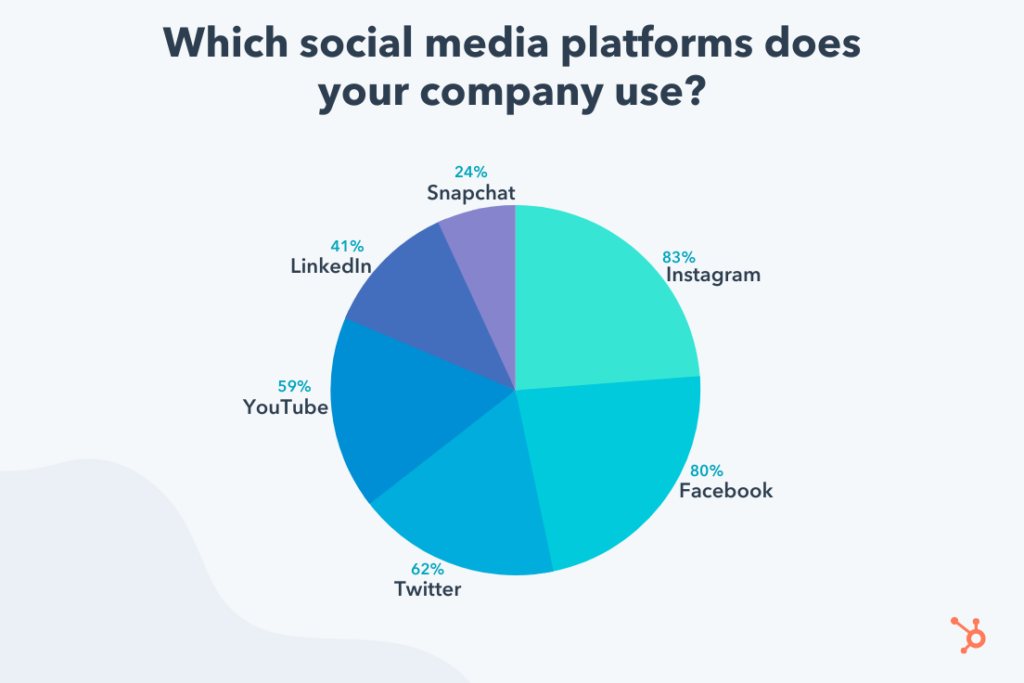
The pie chart above shows the results from Hubspot’s annual survey of marketing professionals. It shows that Facebook and Instagram are by far the two most used platforms for marketing.
If these platforms are good enough for top marketers, they’re certainly good enough for us when it comes to promoting our private practice. As such, I’d recommend focussing your efforts on these two platforms unless you’re already killing it on another platform.
Doing so not only means you’re focusing on platforms that are most likely to generate new client inquiries, but also that you’re not spreading yourself too thin.
Keeping up with every social media app on a consistent basis is something few therapists have the time for.
So, by limiting the number of platforms you use, you’re able to allocate your time and resources more efficiently, ensuring a more concentrated and impactful presence on the selected platforms.
This focused approach not only streamlines your social media management but also allows for deeper engagement with your target audience, increasing the likelihood of meaningful connections and, ultimately, more therapy clients.
B. Create Original, High-Quality Content
Let me be perfectly blunt with you:
Saving inspirational quotes from Google Images and posting them to Facebook isn’t the best way to get clients from social media.
Not only are you not adding anything new to the conversation, you’re also missing out on a golden opportunity to increase brand awareness by sharing content with your practice name, website, or social media handle.
If you do find that quotes resonate with your audience, I recommend learning how to create your own quote images for social media.
Otherwise, you want to focus on creating original content that provides value for your social media audiences, whether that’s an infographic with well-being tips, a short video that helps people better understand their mental health or a link to an article.
Doing so strengthens your position as an expert counsellor and a useful source of information and guidance.
The more useful content you share, the more your social media accounts become go-to destination for those in search of meaningful support and information in the realm of mental health.
This positioning not only strengthens your online presence but also increases the likelihood that individuals will turn to your profile for insights, advice, and ultimately when seeking counseling services.
C. Engage and Interact
Now that you’ve crafted valuable and original content, the next crucial step is to actively engage your audience.
Respond promptly to comments and messages, fostering a sense of connection and responsiveness. Encourage discussions by posing thought-provoking questions or conducting polls related to mental health and wellbeing.
Consider hosting live Q&A sessions or virtual events where your audience can interact directly with you.
Additionally, share behind-the-scenes glimpses of your practice to humanize your brand and build trust. Responding to current events or trends in your field can also demonstrate your awareness and relevance.
Remember, social media is a two-way street – the more you engage authentically, the more likely your audience is to feel connected, valued, and inclined to seek your counseling services.
11. Be An Amazing Therapist
Last, but by certainly no means least, there’s no better way to get more counselling clients than being an absolutely amazing counsellor.
You yourself are the biggest advertisement for your own business, and how you conduct yourself both in and out of your practice will make a world of difference when it comes to building up your client list.
In the therapy room, your job is to help and guide clients to make the changes they want to make in their lives.
Doing that effectively means committing to your CPD, reading and learning more so that you’re well-informed enough to do the best possible job. It means reflecting on your work and making the most of supervision, gaining valuable insights and advice from more experienced therapists.
When you do your job well and clients walk away from their last session feeling as though you’ve really helped them, they’re more likely to refer you to others.
Still, it’s important to remember that since you’re running a private practice, you’re not only a counsellor. You’re also your own receptionist, appointment booker, accountant, and customer service agent.
Falling short in any of these roles can damage your reputation. Going above and beyond, however, can greatly improve it.
This means you really need to be on the ball when it comes to communicating with clients between sessions, managing their appointments and payments, and generally maintaining high professional standards outside of the therapeutic hour.
After all, great customer service contributes significantly to a business’s success. That’s as true in the therapy world as it is in any other industry. So, the more you can do to deliver that great service and provide meaningful value in every interaction, the greater your chances of getting more referrals.
What’s more, it’s important to remember that, as a business owner, you represent your practice around the clock, no matter whether you’re in the therapy room or attending a social gathering.
This means that your professional image extends beyond office hours.
Even in non-work situations, the impression you leave on others can influence their perception of your counselling services.
Taking the time to maintain a positive and approachable demeanour, showcasing empathy and integrity, can contribute significantly to the overall success of your private practice.
How to Get More Counselling Clients: Key Takeaways and Next Steps
From getting to know your audience’s needs and upping your local SEO game to making yourself known through networking, workshops, and events, you’ve now learned a range of strategies to get more counselling clients into your practice.
Still, as varied as some of these methods may be, you may have noticed a few familiar themes that most of them have in common, such as:
- Quality should always be your number one priority – The quality of your marketing materials is just as much a reflection on your counselling practice as the work you do in the therapy room. So, whether you’re creating social media content, writing a blog, or creating local business listings, choose quality over quantity every single time.
- Establishing a reputation as an expert counsellor will pay dividends – Developing trust and credibility is the key to success with many of the 11 private practice growth strategies listed above. That’s much easier to do when you’re perceived as an authority on a specific aspect of counselling, with the skills, knowledge, and resume to back it up.
- Focus on one or two things to get better results – Be an expert on one thing rather than a generalist on everything. Stick to one or two social media platforms rather than trying to use them all. This narrow-focused approach to your marketing not only prevents you from becoming overwhelmed and burned out but also means you can channel more energy and attention into delivering the best possible quality in whatever you do.
This last point in particular brings me to my final word of advice:
Just because I’ve shared 11 strategies with you today doesn’t mean I expect you to run out and immediately use all of them.
Instead, pick just one strategy and implement it to the very best of your ability.
If you’re not sure which one to start with, choose the one aspect of your marketing that you feel is currently letting you down the most.
If you’re getting decent referrals from your directory listings but zero inquiries from social media, for example, start by learning how to make mental health content on Instagram or setting time aside to engage with your audience on Facebook.
Wherever you choose to begin, I wish you the best of luck with growing your private practice in 2024 and beyond.
Enjoyed this post? Get more marketing advice for therapists every week by following Therapist Marketing Tips on Facebook.





